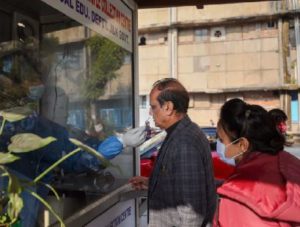
New Delhi: India, on Tuesday, reported 573 fresh Covid cases in the last 24 hours, as per the Union Health Ministry. With the active cases reaching at 4,565, two new fatalities have been reported in the nation, one each in Karnataka and Haryana.
As per INSACOG’s data, a total of 263 cases of COVID-19 sub-variant JN.1 have been detected in the country so far, with about half of them recorded in Kerala.
Ten states and Union territories have so far detected the presence of the JN.1 sub-variant of the virus. These states are Kerala (133), Goa (51), Gujarat (34), Delhi (16), Karnataka (eight), Maharashtra (nine), Rajasthan (five), Tamil Nadu (four), Telangana (two) and Odisha (one), according to the Indian SARS-CoV-2 Genomics Consortium (INSACOG).
As Covid is making the headlines again, experts have raised concerns regarding the long-term effects. While the infections are not turning severe, there can be physiological and psychological effects among a few patients.
Physiological impact
Dr Gutta Lokesh, Consultant Pulmonologist, Manipal Hospital, Vijayawada, said that as the holidays just passed us, there are chances that it amplified the physiological impact of COVID-19 on individuals. The expert said, “Consider an individual, previously brimming with health, now grappling with unforeseen physiological challenges induced by COVID-19. While the virus is notorious for its assault on the respiratory system, it extends its reach to the cardiovascular, neurological, and immune systems. Cardiologists are witnessing a concerning uptick in post-COVID cardiac complications, including severe damage like myocarditis and pericarditis. Neurological specialists note a spectrum of symptoms from persistent headaches to cognitive impairments and “brain fog.”
He added, “Immunologists stress the virus’s knack for compromising the immune system, rendering survivors susceptible to secondary infections and potentially elevating the risk of diabetes. These narratives defy the notion that COVID-19 solely manifests as a respiratory ailment.”
Addressing mental health challenges amid the pandemic
Amidst the physiological fallout, efforts to address mental health challenges precipitated by the pandemic are crucial, especially during the festive season. “Individuals grappling with the aftermath of the virus may experience heightened impatience, anxiety, or depression. It’s imperative to bolster mental health resources, ensuring accessibility and promoting awareness of support networks tailored to those enduring the lasting effects of the virus.” he added.
Awareness, Action, and Advocacy
As the world grapples with the enduring effects of the pandemic and the emergence of new variants, heightened public awareness becomes paramount. JN.1, a novel strain of COVID-19, has been identified. The discovery of this novel strain has spared interest and raised concerns worldwide. Dr Lokesh said, “This shares similarities with previous Omicron strains in terms of high transmissibility and mild symptoms. Recognising the diverse physiological impacts of Covid, is pivotal for holistic prevention and treatment. Continued support for individuals navigating Long Covid underscores the necessity for ongoing research and advocacy.”
The number of daily cases had dropped to double-digits till December 5, but cases have again gone up after the emergence of a new variant and cold weather conditions. The daily numbers were in lakhs at the peak of the pandemic, which began in early 2020 and has seen more than 4.5 crore people getting infected and over 5.3 lakh deaths in about four years since then across the country




 Uber Cup badminton: India’s young women’s squad beats Canada 4-1
Uber Cup badminton: India’s young women’s squad beats Canada 4-1




























